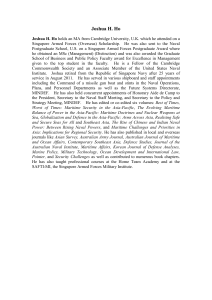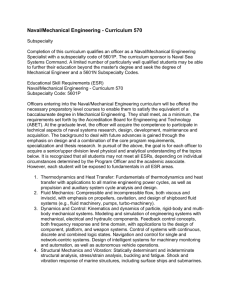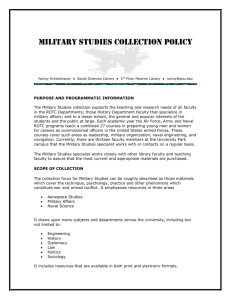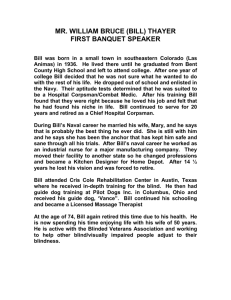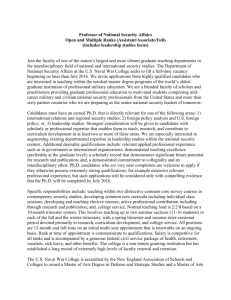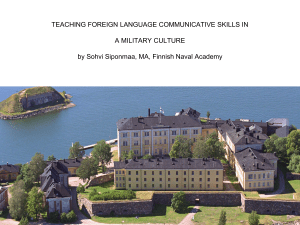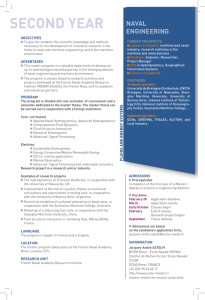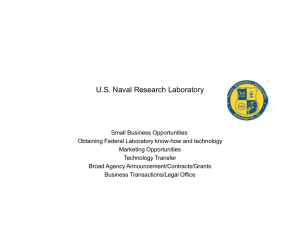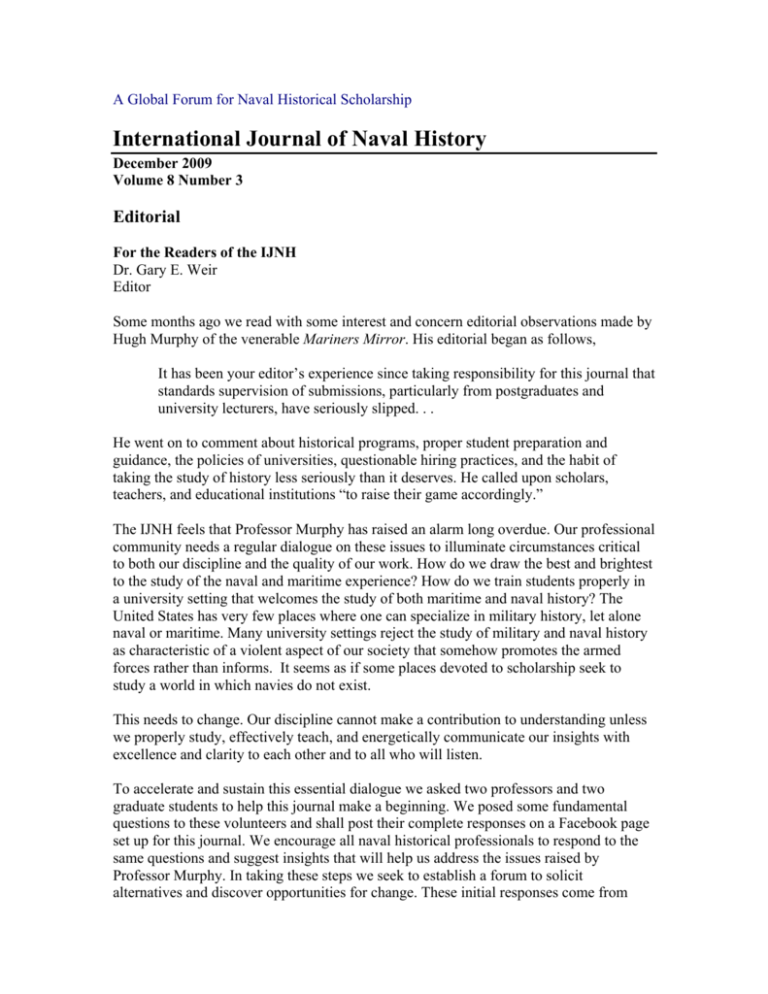
A Global Forum for Naval Historical Scholarship
International Journal of Naval History
December 2009
Volume 8 Number 3
Editorial
For the Readers of the IJNH
Dr. Gary E. Weir
Editor
Some months ago we read with some interest and concern editorial observations made by
Hugh Murphy of the venerable Mariners Mirror. His editorial began as follows,
It has been your editor’s experience since taking responsibility for this journal that
standards supervision of submissions, particularly from postgraduates and
university lecturers, have seriously slipped. . .
He went on to comment about historical programs, proper student preparation and
guidance, the policies of universities, questionable hiring practices, and the habit of
taking the study of history less seriously than it deserves. He called upon scholars,
teachers, and educational institutions “to raise their game accordingly.”
The IJNH feels that Professor Murphy has raised an alarm long overdue. Our professional
community needs a regular dialogue on these issues to illuminate circumstances critical
to both our discipline and the quality of our work. How do we draw the best and brightest
to the study of the naval and maritime experience? How do we train students properly in
a university setting that welcomes the study of both maritime and naval history? The
United States has very few places where one can specialize in military history, let alone
naval or maritime. Many university settings reject the study of military and naval history
as characteristic of a violent aspect of our society that somehow promotes the armed
forces rather than informs. It seems as if some places devoted to scholarship seek to
study a world in which navies do not exist.
This needs to change. Our discipline cannot make a contribution to understanding unless
we properly study, effectively teach, and energetically communicate our insights with
excellence and clarity to each other and to all who will listen.
To accelerate and sustain this essential dialogue we asked two professors and two
graduate students to help this journal make a beginning. We posed some fundamental
questions to these volunteers and shall post their complete responses on a Facebook page
set up for this journal. We encourage all naval historical professionals to respond to the
same questions and suggest insights that will help us address the issues raised by
Professor Murphy. In taking these steps we seek to establish a forum to solicit
alternatives and discover opportunities for change. These initial responses come from
Professor Andrew Lambert of Kings College London and Professor Howard Fuller of the
University of Wolverhampton. Our student responses came from Sebastian Bruns in
Germany and Ryan Wadle in the United States.
In two of his responses Professor Lambert provides an excellent beginning for our
dialogue, giving special attention to the link between naval history, naval historians, and
the naval service. He also expresses well the concern of the IJNH that we dismiss Hugh
Murphy’s questions and warning at our own peril.
Is naval history as respected and valued as other fields of historical study?
Why or why not? Does this effect standards, academic performance, and
institutional support?
In short: it is not. The key problem is that naval history operates in two distinct
fields. Although developed to educate navies it has adopted and applied the
methods of the historical profession. The close link with navies makes it an
unwelcome presence on academic departments that equate the study of war with
its promotion. In academic terms it belongs in the ‘War Studies’ area, a problem
based collection of academic approaches linked by a concern to understand the
problem of war and related violence. The only academic department in Britain
with a consistent track record teaching naval history at post graduate level for the
past forty years is the Department War Studies at King’s College London. It has
high levels of institutional support.
Is the future as grim as Murphy implies—a world characterized by a steep
decline in writing quality with few books being produced, increasingly vapid
content being distributed online, and social networking experts and
information management specialists being valued more than PhDs in
military history—or are there reasons to be optimistic?
Whether we agree with everything Hugh Murphy has said, or not, we should take
heed of his stark warning, and factor it into our decision-making. The biggest
threat we face is complacency, because if he is right the very thing we consider
the pinnacle of academic achievement, the Ph.D. program, is being devalued. Are
we comfortable with the standard of students, academic provision and assessment
currently applied? Some of the more forthright attacks on the original editorial
have generated more heat than light.
We appeal to naval historical professionals, graduate students, naval officers and petty
officers, and friends of the profession to seek out these four first responses to our
questions. Respond to them yourself and share the results with us on the IJNH page at
www.facebook.com . Let us generate an ongoing conversation that may provide ideas
and raw material for changes in both institutional and educational habits.
The Editors
International Journal of Naval History
editors@ijnhonline.org
© Copyright 2010, International Journal of Naval History, All Rights Reserved



